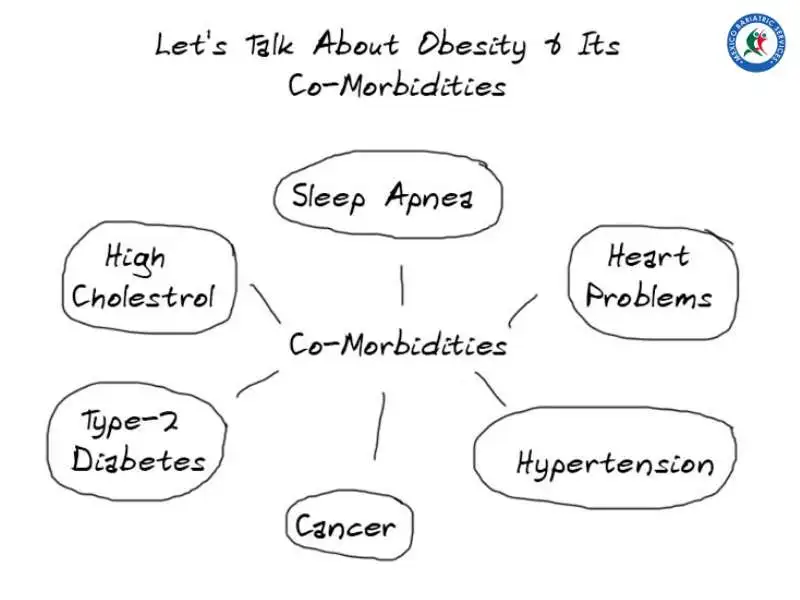How Bariatric Surgery Actually Resolves Related Co-morbidities
Medically Reviewed by Katelyn J. Mock, US-Registered Dietician (R.D.)
- Obesity is associated with type-2 diabetes, hypertension, pre-diabetes, sleep apnea, stroke, dyslipidemia (high cholesterol), and cardiovascular diseases. [1]“Prevalence and Recognition of Obesity and Its Associated Comorbidities: Cross-Sectional Analysis of Electronic Health Record Data from a Large US Integrated Health System.”
View in Article - A major reason why you should consider bariatric surgery is the fact that it helps resolve numerous comorbidities of obesity. [2]“Long-Term Outcomes of Bariatric Surgery: A National Institutes of Health Symposium.”
View in Article - As you lose more weight, you will be able to decrease the dosage or completely do away with the need for some of the medications you take for diabetes, hypertension, cholesterol, etc.
- To reap the benefits of bariatric surgery efficiently, it is important to exercise regularly and eat right. Over time, weight loss is generally accompanied by better health.
A study by Paul M. Coen and colleagues has proved that exercising after bariatric surgery is crucial because it improves insulin sensitivity and the health of the heart and lungs. This can eventually improve one’s diabetic condition. [3]Clinical trial demonstrates exercise following bariatric surgery improves insulin sensitivity
View in Article
Co-morbidity Resolution after Weight Loss Surgery
Type-2 Diabetes
Different weight loss surgeries impact your body differently. A study conducted with 135,000 people concluded that there is an 80% (approx.) chance that people who underwent Gastric Sleeve surgery or Roux-en-Y Gastric Bypass (RYGB) could resolve Type-2 Diabetes.
This number decreased to 57% in the case of people who had laparoscopic adjustable gastric banding (LAGB). [4]Weight and type 2 diabetes after bariatric surgery: systematic review and meta-analysis
View in Article

Cardiovascular Health
A Chinese study conducted in 2017 successfully came to the conclusion that bariatric surgery, particularly Gastric Bypass surgery, improves the patient’s cardiovascular health. ‘Cardiovascular health’ includes risk factors like hypertension and hyperglycemia.
With the help of bariatric surgery, even morbidly obese people can reduce weight. This reduction in weight leads to improvements in glucose levels, lipid profile, and insulin readings which ultimately decreases all cardiovascular risks. [5]Decreased Cardiovascular Risk after Roux-En-Y Gastric Bypass Surgery in Chinese Diabetic Patients with Obesity
View in Article
All my pills are gone. My cardiologist said my heart is stronger than ever, and I feel healthy, energetic, and super grateful! – Jennifer G. (A Mexico Bariatric Services Client)
Sleep Apnea
Obstructive Sleep Apnea is often experienced by obese people characterized by long periods of decreased airflow in the respiratory system.
A related health hazard is premature sudden death from cardiac causes.
Bariatric surgery is known to improve sleep apnea. This improvement can be witnessed in the first 3-6 months. [6]Impact of Bariatric Surgery on Obstructive Sleep Apnoea–hypopnea Syndrome in Morbidly Obese Patients
View in Article
High Cholesterol (Dyslipidemia)
Different bariatric surgeries have had varying effects on the lipid profile. In the case of gastric bypass surgery, there is a reduction in plasma lipids [TC (Total Cholesterol) and LDL (Low-Density Lipoprotein)].
In the case of Vertical Sleeve Gastrectomy, HDL (High-Density Lipoprotein) was affected positively. [7]Different effects of bariatric surgical procedures on dyslipidemia: a registry-based analysis
View in Article
It should be noted that LDL is the bad cholesterol, and HDL is the good cholesterol.
Now is the time to make a lifelong commitment to good health and happiness!
This Page Addresses
- Obesity-related co-morbid conditions
- What co-morbidities qualify for bariatric surgery?
- What medical conditions qualify for bariatric surgery?
- Is bariatric surgery a cure for diabetes?
- Bariatric surgery for diabetes
- Bariatric surgery and diabetes remission
References
- Pantalone, Kevin M et al. “Prevalence and Recognition of Obesity and Its Associated Comorbidities: Cross-Sectional Analysis of Electronic Health Record Data from a Large US Integrated Health System.” BMJ Open 7.11 (2017): e017583. PMC. Web. 19 June 2018.
- Courcoulas, Anita P. et al. “Long-Term Outcomes of Bariatric Surgery: A National Institutes of Health Symposium.” JAMA surgery 149.12 (2014): 1323–1329. PMC. Web. 19 June 2018.
- Paul M. Coen, Charles J. Tanner, et al. “Clinical trial demonstrates exercise following bariatric surgery improves insulin sensitivity” The Journal of Clinical Investigation 2015;125(1):248-257 25 June 2018.
- Buchwald H, Estok R, Fahrbach K, et al. “Weight and type 2 diabetes after bariatric surgery: systematic review and meta-analysis.” Am J Med. 2009;122(3):248–256. 21 June 2018.
- Zhao, Xue et al. “Decreased Cardiovascular Risk after Roux-En-Y Gastric Bypass Surgery in Chinese Diabetic Patients with Obesity.” Journal of Diabetes Research 2017 (2017): 5612049. PMC. Web. 21 June 2018.
- Priyadarshini, Pratyusha et al. “Impact of Bariatric Surgery on Obstructive Sleep Apnoea–hypopnea Syndrome in Morbidly Obese Patients.” Journal of Minimal Access Surgery 13.4 (2017): 291–295. PMC. Web. 21 June 2018.
- Spivak H, Sakran N et al. “Different Effects of Bariatric Surgical Procedures on Dyslipidemia: A Registry-Based Analysis” Surgery for Obesity and Related Diseases: Official Journal of the American Society for Bariatric Surgery 13.7 (2017): 1189-1194. PMC 22 June 2018.
{
“@context” : “http://schema.org”,
“@type” : “Article”,
“headline” : “How Bariatric Surgery Actually Resolves Related Co-morbidities”,
“author”: “Aranza”,
“image” : “https://www.mexicobariatricservices.com/wp-content/uploads/2018/11/Comorbidities-of-Obesity.png”,
“datePublished”: “2018-09-20”,
“publisher”: {
“@type”: “Organization”,
“name”: “Mexico Bariatric Services”,
“logo”: {
“@type”: “ImageObject”,
“url”: “https://www.mexicobariatricservices.com/wp-content/uploads/2019/08/MBS-Logo-1.png”
}
},
“articleSection” : “How Bariatric Surgery Actually Resolves Related Co-morbidities”,
“articleBody” :”A study conducted with 135,000 people concluded that there is 80% (approx.) chance that people who underwent Gastric Sleeve surgery or Roux-en-Y Gastric Bypass (RYGB), could resolve Type-2 Diabetes..A Chinese study conducted in 2017 successfully came to the conclusion that bariatric surgery, particularly Gastric Bypass surgery, improves the patient’s cardiovascular health. ‘Cardiovascular health’ includes risk factors like hypertension and hyperglycemia. Different bariatric surgeries have had varying effects on the lipid profile. In the case of gastric bypass surgery, there is a reduction in plasma lipids [TC (Total Cholesterol) and LDL (Low-Density Lipoprotein)]”,
“url” : ” https://www.mexicobariatricservices.com/knowledgebase/bariatric-surgery-resolves-comorbidities/ ”
}


